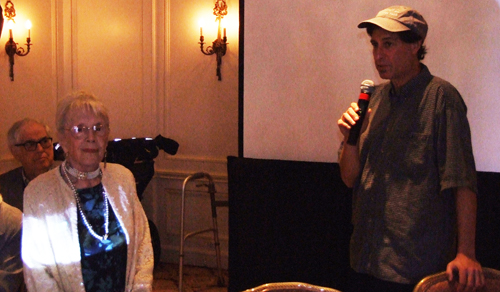
By Donald H. Harrison

SAN DIEGO–Celebrating her 99th birthday with family and friends at a Westgate Hotel brunch, Gabriella Hartstein Auspitz Labson, with the help of film maker Yale Strom, showed a documentary on Sunday, Nov. 24, about her life in a town that changed hands between Czechoslovakia and Hungary, and her subsequent rescue by MP Josiah Wedgwood from the Nazis who turned that town, Munkacs, into a way-station to their death camps.
Strom skillfully interwove archival footage and Hartstein family photos in A Letter to Wedgwood: The Life of Gabriella Hartstein Auspitz for which he and his band Hot P’Strom’i provided Ashkenazic background music. Most of the film was about Gabriella, but it was also a tribute to Josiah Wedgwood, a liberal member of the British Parliament, who as a Christian Zionist became Gabriella’s protector.
It’s normally the policy of San Diego Jewish World to refer to women on second reference by their last names, just as we refer to men. But because during the time period covered by this article, Gabriella used her maiden name (Hartstein), her first married name (Auspitz) and her current surname (Labson),
to avoid confusion, we shall refer to her in this article as Gabriella.
Josiah Wedgewood was a descendant of the 18th century abolitionist and potter whose name he bore and whose family was still associated with fine china and important social causes. Having a tribute to Wedgwood and to Gabriella at the elegant Westgate Hotel seemed somehow fitting, although the Westgate serves its guests not on Wedgwood china but on La Rose de Sables.
Drawing on the story that Gabriella told in her 2004 memoir My Righteous Gentile, Strom’s documentary reported that in the 1920s Wedgwood, who was then a member of Parliament, made a trip to Hungary to observe the political situation there. As Munkacs was a well-known center of Jewish learning, he stopped in the city where, as part of an excited reception for him, Gabriella, then an elementary school student, was pushed forward to present flowers to Wedgwood and to make a little speech of welcome in English.
She set out to do as was expected, but was overwhelmed by all the pomp, and started to cry. Wedgwood picked her up in his arms and wiped away her tears. She couldn’t have known it then, but the connection she made at that moment with Wedgwood saved her from the horrible fate that awaited most of the rest of her family.
After Hungary annexed Munkacs in 1938 , in a deal with the Nazi Germans, more and more restrictions were placed upon the Jews of the city. Gabriella at that time was working as a teacher in the Hebrew academy where she had been educated to the ways of Zionism.
Her father, a rabbi, approved of her Zionism, unlike the Hassidim in town who condemned the use of Hebrew for secular purposes and opposed the notion that ordinary people, rather than the Messiah, could re-establish a Jewish state in Palestine. The more the new Hungarian rulers emulated their Nazi-German allies, the more Gabriella dreamed of immigrating to Palestine.
She came up with the idea of writing a letter to Wedgwood, identifying herself as the former child whom he had once swept up in his arms. Two weeks later, a response came from Wedgwood, the effect of which was to once again wipe away Gabriella’s tears. He said that while he wasn’t able to help her immigrate to Palestine, she could come and live at Moddershall Oaks, his summer home. He also said he would do what he could to help the rest of her family.
And so Gabriella left Munkacs, unaware that the parting would be the last time that she would see her family before they were overtaken by the Nazi juggernaut. She said the kindly Wedgwood treated her like a granddaughter. While she was living under the MP’s sponsorship, Herbert “Harry” Auspitz, an American member of a Philadelphia delicatessen family, met her, romanced her over the next five days, and married her. She later traveled to the U.S. Embassy in London, where Ambassador Joseph Kennedy — father of future President John F. Kennedy–attended to her immigration. One ship she had considered traveling across the Atlantic in, was sunk by the Germans, with extensive loss of life.
In a family video, supplementing the documentary made by Strom, Gabriella noted that her first son,
Josiah Lee Auspitz, was named after her rescuer. She also related that approximately in 1940, Wedgwood traveled to the United States to urge the government to continue its lend-lease program of ships and other military equipment to Britain, even though the U.S. at that time was a neutral power. Wedgwood took time to visit Gabriella and her “good man” at their home in Philadelphia, staying over as a houseguest. Numerous people wanted to be invited to the dinner that Gabriella and Harry hosted for him, but, alas, their dining room table couldn’t fit so many, she recalled at the reception.
The brunch in her honor was hosted by her three Auspitz sons, Josiah Lee, Stanley David, and B. Reuben, who announced during Nov. 23 Shabbat services that they were establishing the “Gabriella Hartstein Auspitz Labson Endowment Fund to benefit our youth so dear to their mother’s heart.”
Proud mother that Gabriella is, she printed up some descriptions of her sons’ educational and professional accomplishments for guests to share. Josiah, a former Marshal Scholar at Oxford University, writes frequently in journals and periodicals about philosophy and foreign policy. Stanley, a San Diegan, has a master’s in education and a certificate as an arts teaching specialist. He is a member of the san Diego Portrait Society, Artist Equity and SDMA Guild. B. Reuben, a Brandeis graduate, serves as president of Manning & Napier Investor Services, based in Rochester, N.Y.
*
Harrison is editor of San Diego Jewish World. He may be contacted at donald.harrison@sdjewishworld.com